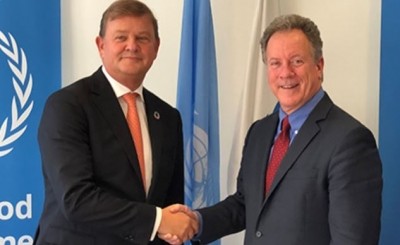Fonterra joins project efforts to address European elderly malnutrition

The five-year European project—PRevention Of Malnutrition In Senior Subjects in the EU (PROMISS)—brings together 24 scientific and nutritional organisations that aims to tackle the issues that come with an increasingly ageing population.
According to PROMISS’ coordinators between 13.5% and 29.7% of older adults living at home in Europe are malnourished or at risk of protein energy malnutrition.
“Older people need more protein to support good health, as malnourishment can cause muscle shrinking, as well as other health-related problems,” said Maarten van Beek, Fonterra director medical nutrition NZMP, Fonterra's global brand of dairy ingredients.
“Not only does improved nutrition make a difference at an individual level, it can also help to reduce strain on healthcare systems,” he added.
The project has received just under €7m in funding from the European Union’s Horizon 2020 research and innovation programme (grant n° 678732).
Protein-energy malnutrition
According to the project’s objectives, it “aims to turn the challenge of tackling protein-energy malnutrition in community-dwelling older persons into an opportunity for healthy ageing for the future.
As part of the project’s food trials to assess taste, and mobility and muscle outcomes, research participants will add Fonterra’s protein-fortified products to their regular diets, including a coconut protein water, a chocolate and vanilla pudding and rice pudding.
Research will form a major part of the project with existing data taken from aging cohorts and European nutritional surveys combined with short- and long-term study data in older persons at risk.
The aim here is to investigate links between diet, physical activity, appetite and malnutrition providing evidence to develop strategies to prevent malnutrition and enhance aspects of healthy ageing.
The project also looks to build on strong collaborations with food industry and SMEs to help strengthen innovation of the European agri-food sector
Along with Fonterra and Kellogg, other institutions involved include the European Society for Clinical Nutrition and Metabolism (ESPEN), Luxembourg, and the Netherlands Organization for Applied Scientific Research (TNO) based in the Netherlands.
PROMISS hope to translate these strategies into practical recommendations to guide policy and health professionals at EU- and Member States level.
The ‘malnutrition cascade’
Speaking last month in the Bioeconomy Innovation CommBeBiz Magazine, Professor Marjolein Visser, nutritionist and health epidemiologist at VU University in Amsterdam and PROMISS coordinator spoke of the need to “stop the malnutrition cascade”.
Professor Visser was referring to the “cascade” of deteriorated body functions and illnesses; muscle loss, cognitive decline, weak immune systems and slowed wound healing that more than 90 % of older people in Europe living at home are at a heightened risk of suffering from.
“A very poor appetite is reported by 10–15 % of them,” she went on.
As a result, the healthy-ageing specialists will first investigate the “body system changes to gain more insights and understand better what the physiological causes of appetite could be”.
Malnutrition in the elderly has become a topic of international concern. In the World Health Organization’s (WHO) report ‘Global Health and Ageing,’ the organisation outlines concerns on the coming global societal shift.
WHO also believe that malnutrition now affects one in six of the global population. In Europe alone the issue of malnutrition impacts more than 30 million citizens.















